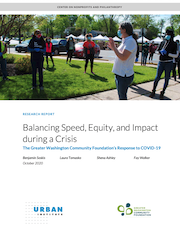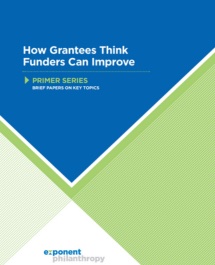Site Search
- resource provided by the Forum Network Knowledgebase.
Search Tip: Search with " " to find exact matches.
"Co-Creation" is a case study about the Connecticut Early Childhood Funder Collaborative, a project of the Connecticut Council for Philanthropy. The case study, written by Patricia Bowie, examines co-creation, an emerging systems change collaboration model which grew out of a funder-and-state partnership. This unique partnership led to the creation by executive order of a new and independent Office of Early Childhood, which was formally approved by the Connecticut State Legislature in 2013. The companion piece, "Taking on New Roles to Address 21st Century Problems," looks at co-creation from the perspective of a regional association of grantmakers.
The Connecticut Early Childhood Funder Collaborative comprises 14 funders from around the state who bring many years of experience in supporting and operating programs that serve the needs of children and families.

The COVID-19 public health and economic crisis has changed our world as we know it. As employers moved to remote work, schools shifted to distance learning, and businesses closed completely, it became clear that the impact on residents, nonprofits, and businesses was far greater than anyone could have ever imagined.
In response to the growing and evolving needs of our region, the Greater Washington Community Foundation established the COVID-19 Emergency Response Fund to raise and rapidly deploy funding to local nonprofits providing food, shelter, educational supports, and other critical services.
From the beginning our goal was clear: to address the immediate needs and reach adversely affected communities, particularly low-income households and communities of color. We know all too well that in a crisis like this, these marginalized communities are hit the hardest, and often take the longest to recover.
In times of crises, The Community Foundation is our region’s philanthropic first responder, bringing together individuals and families, philanthropic peers, corporate partners, and local government advisors to address community issues. Building on our rich history of emergency response work, we grounded our COVID-19 response efforts in a similar coordinated approach.
This report chronicles the steps taken, under immense pressure, to develop a coordinated emergency response effort to support a broad range of needs across the region. Once again this effort has demonstrated that working in partnership and close collaboration with our philanthropic peers and local government advisors is an effective way to manage a response to both urgent and longer-term needs.
A CNJG member queried our listserves with the question "Does anyone have templates that can be used and/or shared related to grant approval letters and terms and conditions related to COVID-19 grants?" CNJG compiled the answers from responding members.

A new nonpartisan resource, Foundation Funding for U.S. Democracy, provides data about foundations and their democracy-related grantmaking in a structured, contextualized, and visual format. Foundation Funding for U.S. Democracy was created through a partnership of eight funders in the field, including the Rita Allen Foundation, and is being developed by the Foundation Center.
The tool allows funders, nonprofits and other interested parties to sift through data on the $1.7 billion (and counting) granted by foundations to strengthen civic engagement in the United States since 2011. For the first time, we have an open tool for visualizing who gave how much to whom for what. While the tool and the data will continue to develop, it already gives a tremendously useful view of opportunities for greater partnerships and knowledge in the field—both for funders and for the organizations, small and large, established and emerging, working to strengthen our democracy. As Kelly Born of the Hewlett Foundation, another of the project partners, writes in a post introducing the tool: “As useful as this data set and visualization will be for foundations already working in the field or new funders considering entering it, the real killer app for this work will be to help grant seekers.”
